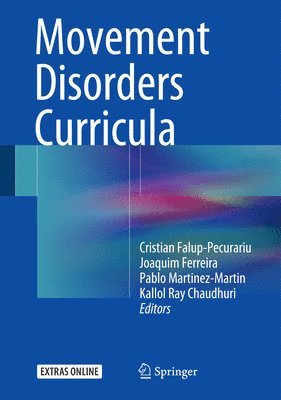
- Format
- Inbunden (Hardback)
- Språk
- Engelska
- Antal sidor
- 453
- Utgivningsdatum
- 2017-03-07
- Upplaga
- 1st ed. 2017
- Förlag
- Springer Verlag GmbH
- Medarbetare
- Falup-Pecurariu, Cristian (ed.), Ferreira, Joaquim (ed.), Martinez-Martin, Pablo (ed.), Chaudhuri, K. Ray (ed.)
- Illustratör/Fotograf
- 100 schwarz-weiße und 10 farbige Abbildungen
- Illustrationer
- 9 Illustrations, color; 17 Illustrations, black and white; XIII, 453 p. 26 illus., 9 illus. in color
- Dimensioner
- 262 x 184 x 27 mm
- Vikt
- Antal komponenter
- 1
- Komponenter
- 1 Hardback
- ISBN
- 9783709116272
- 1149 g
Movement Disorders Curricula
- Skickas från oss inom 7-10 vardagar.
- Fri frakt över 249 kr för privatkunder i Sverige.
Passar bra ihop
De som köpt den här boken har ofta också köpt Emergency Medicine Checklist Compendium av Eric Dryver (häftad).
Köp båda 2 för 1769 krKundrecensioner
Fler böcker av författarna
-
Sexual Dysfunction in Parkinson's Disease
K Ray Chaudhuri, Miriam Parry, Cristian Falup-Pecurariu
-
Autonomic Dysfunction in Parkinson's Disease
Cristian Falup-Pecurariu
-
Device-Aided Therapies in Parkinson's disease
Per Odin, Ray Chaudhuri, Cristian Falup-Pecurariu
-
Intelligent Transportation Systems
Muhammad Alam, Joaquim Ferreira, Jos Fonseca
Övrig information
Cristian Falup-Pecurariu is Head of the Department of Neurology, County Emergency Clinic Hospital from Brasov, and is Lecturer of Neurology at the Transilvania University from Braov, Romania. During his career Prof. Falup-Pecurariu was President of the European Association of Young Neurologists and Trainees (EAYNT), EAYNT Liasion Officer with World Federation of Neurological Society, co-representative of Europe on the International Working Group for Young Neurologists and Trainees (World Federation of Neurology). He was also Secretary of the EFNS/MDS-ES Panel on Movement Disorders, member of the Educational Committee of MDS-ES. Currently is member of the International Parkinson and Movement Disorders Society Leadership Task Force and European Academy of Neurology Scientific Panel Movement Disorders. He is member of EUROPAR (European Parkinsons Group) and International Parkinson and Movement Disorders Society Non motor study group. He is the founder and Course Directorof the Movement Disorders Teaching Course held in Brasov. His research focuses on non-motor aspects of Parkinsons diseases and restless legs syndrome. Prof. Falup-Pecurariu has authored several articles in the major peer-reviewed scientific journals. Joaquim Ferreira is Professor of Neurology and Clinical Pharmacology at the Faculty of Medicine, University of Lisbon and Head of the Laboratory of Clinical Pharmacology and Therapeutics. He is also the head of CNS- Campus Neurolgico Snior in Portugal. He became interested in movement disorders during his medical degree and later undertook a Clinical Pharmacology fellowship with Prof. Olivier Rascol in Toulouse, France. He is currently the chair of the European Section of the International Parkinson and Movement Disorder Society. His major research interests are neuropharmacology, Parkinsons disease, dystonia and Huntigtons disease. Pablo Martinez-Martin is Neurologist and Scientist Researcher ofthe Spanish Public Boards of Research at the National Center of Epidemiology, Carlos III Institute of Health (ISCIII) and Consortium for Biomedical Research in Neurodegenerative Diseases (CIBERNED ISCIII), Madrid, Spain, since 2006. In the past he acted as Coordinator (2003-2006) and Scientific Director of the Research Unit for Alzheimers Disease at the Alzheimer Center Reina Sofia Foundation (2006-2014); Head of the Section of Neuroepidemiology at the National Center of Epidemiology, ISCIII, Madrid, Spain (2001-2006); Head of the Department of Neurology in the Hospital de Getafe (Madrid) (1991-2001) and of the Central Red Cross Hospital (Madrid) (1988-1991); and Head of Section of Neurology in the National Hospital for Infectious Diseases (1982-1988). Associated Professor of Neurology, Department of Health Sciences, School of Medicine, Complutense University, Madrid (1989-1993). He has received 14 awards in Neurosciences, Aging, and Parkinsons disease. Member of several international Study Groups, Steering Committees for research, and Task Forces of the Movement Disorder Society and the European Federation of Neurological Societies. Chair of the Committee on Rating Scales Development of the International Parkinson and Movement Disorder Society since 2013. His main research lines are: Assessment instruments (rating scales, questionnaires), Patient-Reported Outcomes, particularly health-related quality of life; Outcomes research; Neurodegenerative diseases, particularly Parkinsons and Alzheimers diseases; Dementia. Prof. Martinez-Martin has published over 380 articles in scientific journals, 99 chapters of book and 17 books as editor or co-editor. He has given 173 lectures as Invited Professor in teaching institutions, 178 talks in scientific events, and presented 422 reports to congresses. Chair and Convenor of 56 Scientific meetings and Teaching courses. K Ray Chaudhuri is the Clinical Director of the National Parkinson Foundation International Centre of Excellence at Kings Coll
Innehållsförteckning
Part 1. Overview.- Computational physiology of the basal ganglia, movement disorders and their therapy.- Animal models of movement disorders.- Epidemiological methods for studying movement disorders.- Clinical overview and phenomenology of movement disorders.- Neuropathology of movement disorders: an overview.- Rational and methodology for the appraisal of clinical trials in movement disorders.- How to record a video of a movement disorders patient.- Rating scales in movement disorders.- Genetics of movement disorders.- Part 2. Parkinsons Disease.- Etiology and pathogenesis of Parkinson's disease.- Clinical features and differential diagnosis of Parkinsons disease.- Non-motor problems in Parkinsons disease.- The natural history of Parkinsons disease.- Medical treatment of Parkinsons disease.- Surgical treatment of PD, transplantations and restorative therapies for Parkinsons disease.- Quality of life in Parkinsons disease.- Part 3. Other Movement Disorders.- Multiple system atrophy.- Progressive supranuclear palsy.- Cortico-basal degeneration.- Lewy body dementia and related syndromes.- Toxic-induced Parkinsonism.- Vascular parkinsonism.- Stiff-person syndromes.- Dystonia.- Huntington disease.-Chorea, ballism, athetosis.-Tardive dyskinesia.- Tics and Tourette syndrome.- Tremors: differential diagnosis, pathophysiology, and thera.- Myoclonus and Startle syndromes: phenomenology, etiology, physiology, and treatment.- Ataxia: pathophysiology, and clinical syndromes.- The paroxysmal dyskinesias.-Wilson disease neurological aspects; clinical manifestations and treatment considerations.- Psychogenic movement disorders: phenomenology, diagnosis, and treatment.- REM sleep behavior disorder.- Restless legs syndrome and painful legs/moving toes.- Botulin toxin in movement disorders and spasticity.- Pantothenate Kinase-Associated Neurodegeneration.- Movement disorders of the face.- Drug-induced movement disorders.- Stereotypy.- Movement disorders in children.- Systemic illnesses that cause movement disorders.- Neuroacanthocytosis syndromes.


